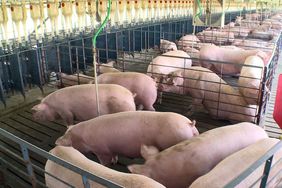:max_bytes(150000):strip_icc()/__opt__aboutcom__coeus__resources__content_migration__mnn__images__2020__01__LincolnwayEnergyEthanolPlant-f090f8256c0d401ebe716baaa8366c88.jpg)
The EPA will have to take a new look at requests for three dozen “hardship” exemptions from the ethanol mandate under a ruling by the U.S appeals court in Washington. Ethanol makers, “extremely disappointed” by the ruling, said they were considering a response, “which may include seeking further review of today’s decision.”
At issue was EPA’s denial in April 2022 of 36 requests by small refiners for a waiver from the Renewable Fuel Standard requirement to blend biofuels into gasoline for cars and pickup trucks. At the time, the EPA said the refineries did not face disproportionate economic harm if they had to buy credits, known as RINs, to make up for their failure to mix enough ethanol into gasoline.
The appellate court vacated the denials on Friday and ordered the cases remanded to the EPA for further proceedings. The court opinion was sealed from public view so the its reasoning and specific instruction to EPA were not known. In April, judges on the appeals court questioned whether the EPA was overly strict in determining if a refiner faced financial hardship in complying with the RFS, reported E&E News.
“EPA’s decision in 2022 to deny the petitions was well-reasoned, based on sound economic analysis, and consistent with the Clean Air Act and the objectives of the Renewable Fuel Standard,” said three biofuel trade groups—the American Coalition for Ethanol, Growth Energy, and the Renewable Fuels Association. “We will evaluate our next steps, which may include seeking further review of today’s decision. Our coalition remains resolute and committed to protecting and defending the proper implementation of the RFS.”
During the Trump era, the EPA issued dozens of waivers from the RFS. Biofuel advocates said the exemptions amounted to a 1.4-billion-gallon reduction in ethanol demand at a time when the RFS generally set a target of blending 15 billion gallons a year of corn ethanol into motor fuel. When it took office, the Biden administration indicated it would be more stringent in evaluating requests for exemptions.
Involved in the EPA’s decision in 2022 were exemptions granted by Trump officials for RFS obligations in 2018. The 36 exemptions were part of a Supreme Court ruling in 2021 on EPA discretion to issue RFS waivers. Based on that ruling, an appeals court told the EPA to decide by April 7, 2022, on whether or grant or deny them. The EPA denied them and said it would create an alternative method of compliance for 31 refiners that did not require them to buy or retire RINs.
In addition to remanding the exemptions to the EPA, the appellate court also dismissed a lawsuit challenging the EPA alternate method of compliance.
:max_bytes(150000):strip_icc()/ag-insider-credit_640x320-470ba0d2e59a48198b243a3f3b5a3a4c.png)












